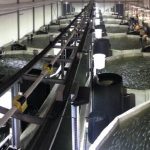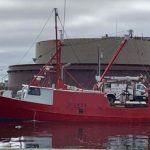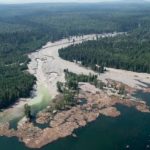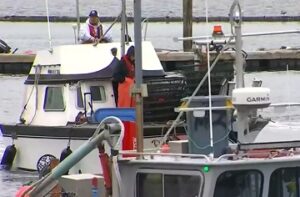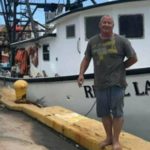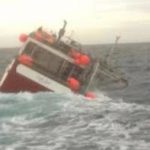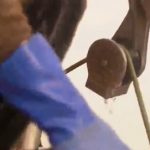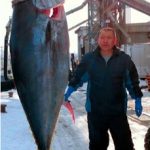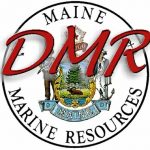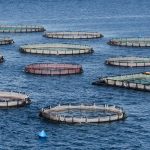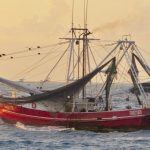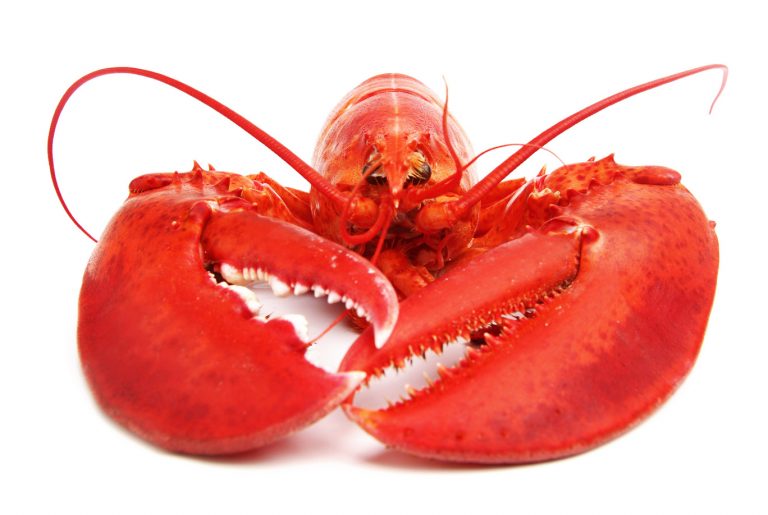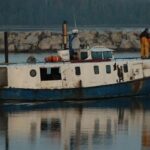Monthly Archives: April 2016
Louisiana’s Upcoming shrimp season could be similar to last year
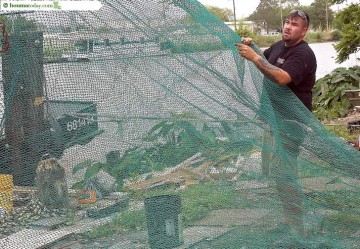 LDWF biologist Jeff Marx told the Shrimp Task Force Wednesday in Houma that while he doesn’t have the data to make predictions on how the upcoming season will unfold, he can show parallels to previous years. That leads to the conclusion that this year’s season has the characteristics of 2015, which was a hot year. Marx said small shrimp aren’t being seen in the basins yet. “It’s a good spread, but things change. If we get a big influx of small shrimp, it changes things. There’s a big difference between a cold year and what’s going on this year,” he said. Two things worth keeping an eye on are the “huge discharge” of water from the Mississippi River in the early parts of the year and the salinity levels. Read the rest here 08:31
LDWF biologist Jeff Marx told the Shrimp Task Force Wednesday in Houma that while he doesn’t have the data to make predictions on how the upcoming season will unfold, he can show parallels to previous years. That leads to the conclusion that this year’s season has the characteristics of 2015, which was a hot year. Marx said small shrimp aren’t being seen in the basins yet. “It’s a good spread, but things change. If we get a big influx of small shrimp, it changes things. There’s a big difference between a cold year and what’s going on this year,” he said. Two things worth keeping an eye on are the “huge discharge” of water from the Mississippi River in the early parts of the year and the salinity levels. Read the rest here 08:31
Mid Atlantic Council Approves Changes to Scup Gear-Restricted Areas
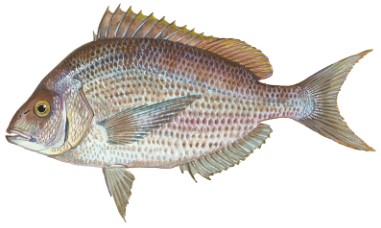 During a meeting in Montauk, New York the Mid-Atlantic Fishery Management Council approved a framework action to modify the boundary of one of the region’s two Scup Gear Restricted Areas (GRAs). The proposed change to the Southern Scup GRA boundary is expected to increase the availability of longfin squid to small-mesh fisheries. The GRAs were implemented in 2000 and are intended to reduce discard mortality of juvenile scup. The current GRA regulations include a Northern GRA, which is effective from November 1 through December 31, and a Southern GRA, which is effective from January 1 through March 15. Trawl vessels which fish for or possess longfin squid, black sea bass, or silver hake (also known as whiting) are required to use mesh 5 inches or larger in the GRAs during those times of the year. Read the rest here 07:40
During a meeting in Montauk, New York the Mid-Atlantic Fishery Management Council approved a framework action to modify the boundary of one of the region’s two Scup Gear Restricted Areas (GRAs). The proposed change to the Southern Scup GRA boundary is expected to increase the availability of longfin squid to small-mesh fisheries. The GRAs were implemented in 2000 and are intended to reduce discard mortality of juvenile scup. The current GRA regulations include a Northern GRA, which is effective from November 1 through December 31, and a Southern GRA, which is effective from January 1 through March 15. Trawl vessels which fish for or possess longfin squid, black sea bass, or silver hake (also known as whiting) are required to use mesh 5 inches or larger in the GRAs during those times of the year. Read the rest here 07:40
U.S. fisheries continue to rebuild; number of overfished stocks remains near all-time low
 Total number of rebuilt U.S. marine fish stocks since 2000 rises to 39. The number of domestic fish stocks listed as overfished or subject to overfishing remain near all-time lows, according to the report to Congress. Click here to view> The 2015 report highlights the United States’ continued progress towards managing fish stocks sustainably. This is a result of the combined efforts of NOAA Fisheries, commercial and recreational fishermen, the regional fishery management councils, states, and other partners. In 2015, eight stocks came off the overfishing list. 07:31
Total number of rebuilt U.S. marine fish stocks since 2000 rises to 39. The number of domestic fish stocks listed as overfished or subject to overfishing remain near all-time lows, according to the report to Congress. Click here to view> The 2015 report highlights the United States’ continued progress towards managing fish stocks sustainably. This is a result of the combined efforts of NOAA Fisheries, commercial and recreational fishermen, the regional fishery management councils, states, and other partners. In 2015, eight stocks came off the overfishing list. 07:31
Staging A Storm Scene! ‘Deadliest Catch’ Writer Caught In Blatant Fakery Scheme!
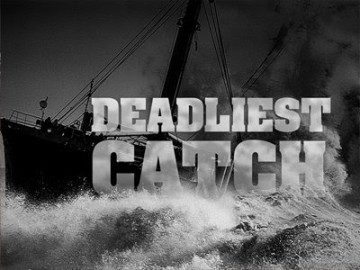 Of course the Kardashians have shamelessly staged scenes for their “reality” show — The Hollywood Reporter accused the gritty Discovery channel hit, featuring seasoned fishermen including Sig Hansen and Josh Harris, of faking a terrible storm in the 4th season premier. On the 2008 episode, “mammoth waves smashed an Alaskan crab fishing boat called the Wizard, sending large swells crashing over its deck,” writer James Hibberd wrote. “Inside, alarmed crew members discover that their stateroom is flooding with incoming seawater.” Adding even more fuel to the fire, the site even discovered an alleged “outline” from the episode. Read the story here 21:18
Of course the Kardashians have shamelessly staged scenes for their “reality” show — The Hollywood Reporter accused the gritty Discovery channel hit, featuring seasoned fishermen including Sig Hansen and Josh Harris, of faking a terrible storm in the 4th season premier. On the 2008 episode, “mammoth waves smashed an Alaskan crab fishing boat called the Wizard, sending large swells crashing over its deck,” writer James Hibberd wrote. “Inside, alarmed crew members discover that their stateroom is flooding with incoming seawater.” Adding even more fuel to the fire, the site even discovered an alleged “outline” from the episode. Read the story here 21:18
‘We haven’t recovered,’ Coast fishermen say on 6th anniversary of BP oil spill
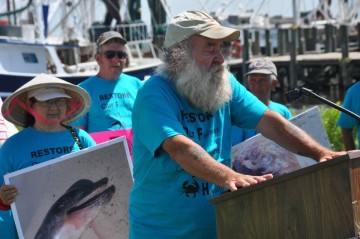 Members of the Coast fishing industry gathered Wednesday at Sherman Caan Back Bay Fishing Dock in East Biloxi to commemorate the sixth anniversary of the BP oil spill. Those in attendance were a mixture of fishermen, oystermen and members of the Vietnamese fishing community. The commemoration was organized by fishing activist Thao Vu of the Mississippi Coalition for Vietnamese Fisher Folks and Families. About 15 people attended the ceremony, carrying protest signs to show their continued frustration with the oil company. “East Biloxi used to be the fresh seafood capitol of the world,” Vu said with Biloxi Bay as her backdrop. “But look at it since the BP oil spill six years ago.” Read the rest here 19:26
Members of the Coast fishing industry gathered Wednesday at Sherman Caan Back Bay Fishing Dock in East Biloxi to commemorate the sixth anniversary of the BP oil spill. Those in attendance were a mixture of fishermen, oystermen and members of the Vietnamese fishing community. The commemoration was organized by fishing activist Thao Vu of the Mississippi Coalition for Vietnamese Fisher Folks and Families. About 15 people attended the ceremony, carrying protest signs to show their continued frustration with the oil company. “East Biloxi used to be the fresh seafood capitol of the world,” Vu said with Biloxi Bay as her backdrop. “But look at it since the BP oil spill six years ago.” Read the rest here 19:26
Is America’s First Offshore Wind Farm A Real Revolution Or Just Another Green Boondoggle?
 Manna From Heaven: How D.E. Shaw and a politically connected attorney persuaded Rhode Island to build America’s first-ever offshore wind farm–and a risk-free money machine. So how did they pull this off? Connections. A decade ago Grybowski was chief of staff to then Governor Don Carcieri, who pushed the Rhode Island General Assembly to back offshore wind as a way of diversifying the tiny state’s power supply. Grybowski, an attorney, left Carcieri and went into private practice in 2007. Two years later the state passed a bill to support offshore wind. The state took it upon itself to study wind speeds, talk to fishermen and boaters, and contemplate the effect that pile-driving would have on migrating whales. It was the state that chose the Block Island site and, to use Grybowski’s word, “deconflicted” the project. Read the rest here 17:25
Manna From Heaven: How D.E. Shaw and a politically connected attorney persuaded Rhode Island to build America’s first-ever offshore wind farm–and a risk-free money machine. So how did they pull this off? Connections. A decade ago Grybowski was chief of staff to then Governor Don Carcieri, who pushed the Rhode Island General Assembly to back offshore wind as a way of diversifying the tiny state’s power supply. Grybowski, an attorney, left Carcieri and went into private practice in 2007. Two years later the state passed a bill to support offshore wind. The state took it upon itself to study wind speeds, talk to fishermen and boaters, and contemplate the effect that pile-driving would have on migrating whales. It was the state that chose the Block Island site and, to use Grybowski’s word, “deconflicted” the project. Read the rest here 17:25
Safety Training for Commercial Fishermen in Montauk – 4/27/2016
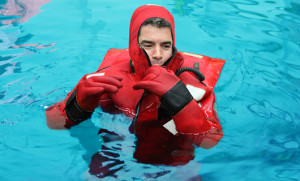 Commercial fishermen can take advantage of free safety training programs that will be offered next week at the Montauk Coast Guard Station. , a Massachusetts organization that supports the health and well-being of fishing families, will present a safety and survival training program on Wednesday from 7:30 a.m. to 3:30 p.m. at the Coast Guard station on Star Island Road. On-board firefighting, man-overboard procedures, flooding and pump operations, flares and emergency positioning devices, survival suits, life raft equipment, helicopter hoist and rescue procedures, and first aid will be covered during the program. Read the rest here 16:22
Commercial fishermen can take advantage of free safety training programs that will be offered next week at the Montauk Coast Guard Station. , a Massachusetts organization that supports the health and well-being of fishing families, will present a safety and survival training program on Wednesday from 7:30 a.m. to 3:30 p.m. at the Coast Guard station on Star Island Road. On-board firefighting, man-overboard procedures, flooding and pump operations, flares and emergency positioning devices, survival suits, life raft equipment, helicopter hoist and rescue procedures, and first aid will be covered during the program. Read the rest here 16:22
Moratorium on oil and gas activities on Canadian portion of Georges Bank in affect
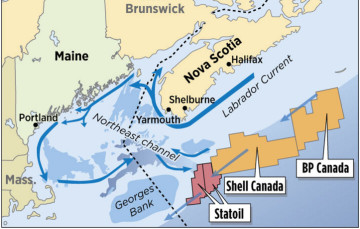 The sustainability and health of one of North America’s most valuable marine ecosystems will be better protected thanks to ongoing collaboration between the governments of Canada and Nova Scotia. The Honourable Jim Carr, Canada’s Minister of Natural Resources, and his provincial counterpart, the Honourable Michel Samson, Minister of Energy for Nova Scotia, have enacted a statutory moratorium on oil and gas activities in the of Georges Bank. The moratorium took effect April 15. Georges Bank, a large submarine bank at the edge of the Atlantic continental shelf between Cape Cod and Nova Scotia, provides habitat for a wide range of marine fish, mammals and corals. As one of the world’s most productive fishing grounds, Georges Bank also supports important commercial fisheries. Read the rest here 15:53
The sustainability and health of one of North America’s most valuable marine ecosystems will be better protected thanks to ongoing collaboration between the governments of Canada and Nova Scotia. The Honourable Jim Carr, Canada’s Minister of Natural Resources, and his provincial counterpart, the Honourable Michel Samson, Minister of Energy for Nova Scotia, have enacted a statutory moratorium on oil and gas activities in the of Georges Bank. The moratorium took effect April 15. Georges Bank, a large submarine bank at the edge of the Atlantic continental shelf between Cape Cod and Nova Scotia, provides habitat for a wide range of marine fish, mammals and corals. As one of the world’s most productive fishing grounds, Georges Bank also supports important commercial fisheries. Read the rest here 15:53
Congressional bills aim to kill Biscayne National Park’s protected no-fishing zone
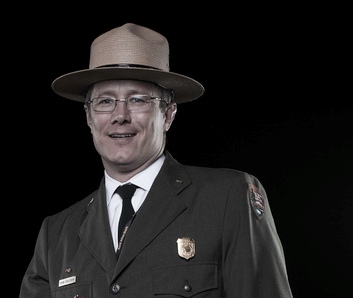 A planned no-fishing zone in Biscayne National Park could be undone by Congress. U.S. Sen. Marco Rubio (R-Fla.) Sen. Bill Cassidy (R-La.) this week filed a Senate bill called the Preserving Public Access to Public Waters Act that puts the 16-square-mile Biscayne marine reserve in its crosshairs. Sport and commercial fishing organizations, including the CCA and the Florida Keys Commercial Fishermen’s Association, protested the reserve as excessive and endorsed the congressional bills intended to remove it. The Florida Fish and Wildlife Conservation Commission objected to closing a reef-fishing area accessible to the large South Florida boating community. Read the rest here 14:36
A planned no-fishing zone in Biscayne National Park could be undone by Congress. U.S. Sen. Marco Rubio (R-Fla.) Sen. Bill Cassidy (R-La.) this week filed a Senate bill called the Preserving Public Access to Public Waters Act that puts the 16-square-mile Biscayne marine reserve in its crosshairs. Sport and commercial fishing organizations, including the CCA and the Florida Keys Commercial Fishermen’s Association, protested the reserve as excessive and endorsed the congressional bills intended to remove it. The Florida Fish and Wildlife Conservation Commission objected to closing a reef-fishing area accessible to the large South Florida boating community. Read the rest here 14:36
Charleston’s maritime history – The mosquito fleet
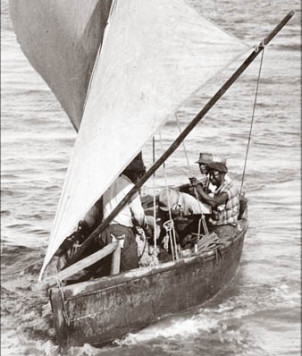 They were among the best watermen in Charleston’s maritime history, their small boats a familiar and beloved sight as they sailed out each morning and returned each afternoon with their catch. From the 1860s until the 1950s, the several hundred African American fishermen who worked the sailing boats of the mosquito fleet formed the core of Charleston’s seafood industry. They fished the creeks, rivers, harbor, and, weather permitting, the offshore banks. They would often go as far out as 30 miles to catch porgy, bass, whiting and, if lucky, a “jack fish.” “One by one they shoved off, and lay in the stream while they adjusted their spritsails and rigged their full jibs abeam, like spinnakers, for the free run to the sea,” wrote Dubose Heyward, describing Charleston’s mosquito fleet in his celebrated novel, Porgy. Read the rest here 13:58
They were among the best watermen in Charleston’s maritime history, their small boats a familiar and beloved sight as they sailed out each morning and returned each afternoon with their catch. From the 1860s until the 1950s, the several hundred African American fishermen who worked the sailing boats of the mosquito fleet formed the core of Charleston’s seafood industry. They fished the creeks, rivers, harbor, and, weather permitting, the offshore banks. They would often go as far out as 30 miles to catch porgy, bass, whiting and, if lucky, a “jack fish.” “One by one they shoved off, and lay in the stream while they adjusted their spritsails and rigged their full jibs abeam, like spinnakers, for the free run to the sea,” wrote Dubose Heyward, describing Charleston’s mosquito fleet in his celebrated novel, Porgy. Read the rest here 13:58
Athearn Marine Agency Boat of the Week: 43′ Fiberglass Novi Scalloper, 320HP, 6 Cylinder Isuzu
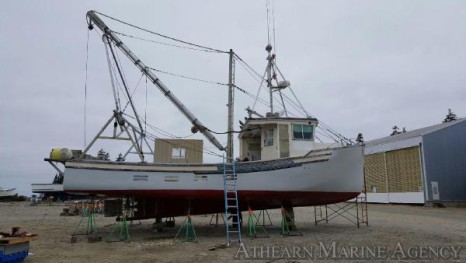 Specifications, information and 30 photo click here To see all the boats in this series, Click here 12:34
Specifications, information and 30 photo click here To see all the boats in this series, Click here 12:34
Impasse between fishery and tribal leaders puts Puget Sound salmon season in jeopardy
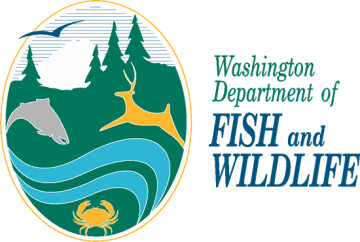 State fishery managers announced late Tuesday they had reached an impasse with tribal leaders over a salmon season this summer. It will now be in the hands of the federal government to make the final decision that will affect the livelihoods thousands of people connected to the salmon fishery. Officials with the Washington Department of Fish and Wildlife are uncertain if a permit will be issued in time to hold recreational and non-tribal commercial fisheries in Puget sound. “This isn’t the outcome we had hoped for, but we will do our best to obtain a federal permit as quickly as possible,” said Ron Warren, head of WDFW’s Fish Program said in a statement Read the rest here 11:56
State fishery managers announced late Tuesday they had reached an impasse with tribal leaders over a salmon season this summer. It will now be in the hands of the federal government to make the final decision that will affect the livelihoods thousands of people connected to the salmon fishery. Officials with the Washington Department of Fish and Wildlife are uncertain if a permit will be issued in time to hold recreational and non-tribal commercial fisheries in Puget sound. “This isn’t the outcome we had hoped for, but we will do our best to obtain a federal permit as quickly as possible,” said Ron Warren, head of WDFW’s Fish Program said in a statement Read the rest here 11:56
Taste-test unwraps flavor of shark fishery’s potential – Commercial Fisherman Dewey Hemilright was on hand
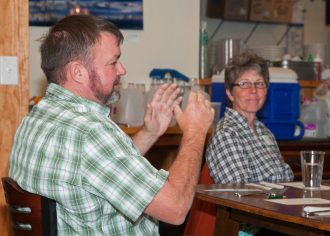 The third and final tasting event in the North Carolina Sea Grant Shark Sensory Evaluation has come and gone.,, Commercial Fisherman Dewey Hemilright was on hand to expand on Mirabilio’s presentation. Hemilright is an advocate for North Carolina commercial fishermen, a tireless educator and is active in Outer Banks Catch and the N. C. Coastal Federation and other related organizations. “These taste testing put on by Sea Grant, Sara and Cafe Lachine are most important in the future success in bringing cape shark to the consumer plates here in the U.S.,” said Hemilright. “Sara did an awesome job presenting. She gets it! This fishery is sustainable and is not overfished.” Read the rest here 09:23
The third and final tasting event in the North Carolina Sea Grant Shark Sensory Evaluation has come and gone.,, Commercial Fisherman Dewey Hemilright was on hand to expand on Mirabilio’s presentation. Hemilright is an advocate for North Carolina commercial fishermen, a tireless educator and is active in Outer Banks Catch and the N. C. Coastal Federation and other related organizations. “These taste testing put on by Sea Grant, Sara and Cafe Lachine are most important in the future success in bringing cape shark to the consumer plates here in the U.S.,” said Hemilright. “Sara did an awesome job presenting. She gets it! This fishery is sustainable and is not overfished.” Read the rest here 09:23
Commercial fishermen need our support
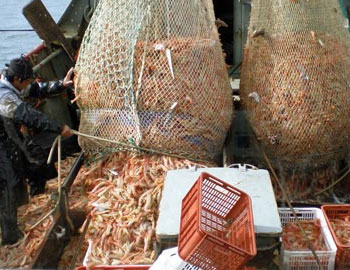 In Dulac and Golden Meadow, Chauvin and Pointesaux-Chenes, shrimpers are readying their vessels for a new season, hoping that nature and the markets will smile on their efforts, and provide not only a bountiful crop but prices that will support their livelihoods. Like the shrimpers, crabbers and oystermen have faced significant challenges, and all are working hard as always to keep afloat. The visible signs of their industry, located as they are in communities where many of us don’t spend time unless recreating, go unseen by most of us. But they are there, day in and day out. They know that their numbers have dwindled, that their infrastructure – the packing houses to which many sell their harvests – is dwindling as well. Read the op-ed here 08:44
In Dulac and Golden Meadow, Chauvin and Pointesaux-Chenes, shrimpers are readying their vessels for a new season, hoping that nature and the markets will smile on their efforts, and provide not only a bountiful crop but prices that will support their livelihoods. Like the shrimpers, crabbers and oystermen have faced significant challenges, and all are working hard as always to keep afloat. The visible signs of their industry, located as they are in communities where many of us don’t spend time unless recreating, go unseen by most of us. But they are there, day in and day out. They know that their numbers have dwindled, that their infrastructure – the packing houses to which many sell their harvests – is dwindling as well. Read the op-ed here 08:44
CCA is telling fish tales about Omega Protein
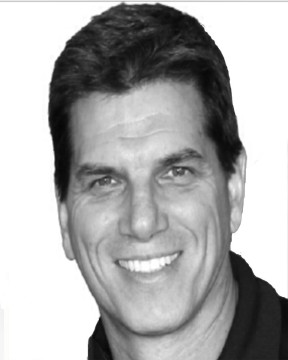 On April 2, the Sun Herald published an op-ed from the spokesman of the Coastal Conservation Association — Mississippi, F.J. Eicke (“A most important fish raises need for public scrutiny”), that was filled with more holes than a fisherman’s net. Sadly, time and time again, Mr. Eicke has demonstrated dismissiveness toward sustainable fisheries and the hardworking men and women of Mississippi’s commercial fishing industry. A major contention offered by Mr. Eicke is that Mississippi’s resident menhaden stock is troubled. This statement is 100 percent incorrect and is little more than a scare tactic. There is no such thing as “Mississippi menhaden.” Due to their very nature — their biology and habitat — menhaden are a Coastwide migratory species, which is why menhaden stock assessments are conducted on a Coastwide basis. Read the rest here 21:47
On April 2, the Sun Herald published an op-ed from the spokesman of the Coastal Conservation Association — Mississippi, F.J. Eicke (“A most important fish raises need for public scrutiny”), that was filled with more holes than a fisherman’s net. Sadly, time and time again, Mr. Eicke has demonstrated dismissiveness toward sustainable fisheries and the hardworking men and women of Mississippi’s commercial fishing industry. A major contention offered by Mr. Eicke is that Mississippi’s resident menhaden stock is troubled. This statement is 100 percent incorrect and is little more than a scare tactic. There is no such thing as “Mississippi menhaden.” Due to their very nature — their biology and habitat — menhaden are a Coastwide migratory species, which is why menhaden stock assessments are conducted on a Coastwide basis. Read the rest here 21:47
Fishermen Need to Know – 10 Day comment period April 16-26 – Nature Conservancy EM project
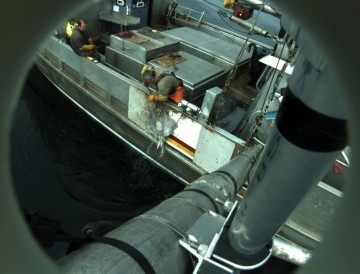 NOAA and it’s environmental partners are bound and determined to force paid monitoring and eventually EMS on the fishermen. The last EMS study that was delayed and delayed so that NOAA’s partners could put out misinformation about about costs. And still when the report did come out it substantially underestimates costs by assuming the average groundfish trip is 1.5 days when in reality my sector’s average trip is 6-10 days. 4 to 7 times greater in duration. It underestimates number of hauls by claiming average trip has 5 haul backs, when in reality we are looking at 40-60 hauls per trip, an underestimation by a factor of 10. Even at these severe underestimations the report puts EM start up costs at $59,575 plus an average annual cost of $50,619 plus an estimated first year learning fee of $42,684 for a total of an estimated first year cost of $152,878. 15 to 25 percent of a groundfish boat’s GROSS income! That doesn’t even take into account the underestimation by a factor of 4-10 of groundfish trip effort. (GMRI A Preliminary Cost Comparison of At Sea Monitoring and Electronic Monitoring for a Hypothetical Groundfish Sector) Captain Mark Phillips – Read the Nature Conservancy EM project application click here Federal Register Notice; Request For Comments. click here 20:02
NOAA and it’s environmental partners are bound and determined to force paid monitoring and eventually EMS on the fishermen. The last EMS study that was delayed and delayed so that NOAA’s partners could put out misinformation about about costs. And still when the report did come out it substantially underestimates costs by assuming the average groundfish trip is 1.5 days when in reality my sector’s average trip is 6-10 days. 4 to 7 times greater in duration. It underestimates number of hauls by claiming average trip has 5 haul backs, when in reality we are looking at 40-60 hauls per trip, an underestimation by a factor of 10. Even at these severe underestimations the report puts EM start up costs at $59,575 plus an average annual cost of $50,619 plus an estimated first year learning fee of $42,684 for a total of an estimated first year cost of $152,878. 15 to 25 percent of a groundfish boat’s GROSS income! That doesn’t even take into account the underestimation by a factor of 4-10 of groundfish trip effort. (GMRI A Preliminary Cost Comparison of At Sea Monitoring and Electronic Monitoring for a Hypothetical Groundfish Sector) Captain Mark Phillips – Read the Nature Conservancy EM project application click here Federal Register Notice; Request For Comments. click here 20:02Mississippi Commission on Marine Resources denies request for 1-mile menhaden fishing limit
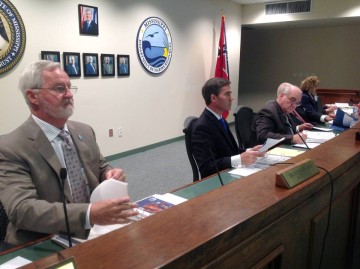 The Mississippi Commission on Marine Resources denied Jackson County’s request to limit menhaden fishing to at least a mile off the county’s mainland. The vote was unanimous and came after the commission listened to arguments from both sides of the issue. On March 7, the Jackson County Board of Supervisors voted 3-2 to ask the state to limit menhaden boats to 1 mile offshore. The move would have closed 22 square miles of the Sound to commercial fishing by the company Omega Protein of Moss Point. Both the Coastal Conservation Association and Omega Protein went before the CMR. In the final vote, it came down to science and concern for industry. Read the article here 19:23
The Mississippi Commission on Marine Resources denied Jackson County’s request to limit menhaden fishing to at least a mile off the county’s mainland. The vote was unanimous and came after the commission listened to arguments from both sides of the issue. On March 7, the Jackson County Board of Supervisors voted 3-2 to ask the state to limit menhaden boats to 1 mile offshore. The move would have closed 22 square miles of the Sound to commercial fishing by the company Omega Protein of Moss Point. Both the Coastal Conservation Association and Omega Protein went before the CMR. In the final vote, it came down to science and concern for industry. Read the article here 19:23
Michael Gove mercilessly mocked over embarrassing fishy cock-up
 Michael Gove was left red-faced after he said fishing was “very close to my heart” – but then blundered over the names of two major ports. The Brexit backing Justice Secretary was having a pop at the EU’s common fisheries policy. He blames the rules for the collapse of his father’s business as a fish merchant in Aberdeen. But he stumbled over the names of two Scottish ports – referring to Peterborough and Fraserhead rather than Fraserburgh and Peterhead. Of course, the internet was merciless in its mockery. Read the rest here 18:29
Michael Gove was left red-faced after he said fishing was “very close to my heart” – but then blundered over the names of two major ports. The Brexit backing Justice Secretary was having a pop at the EU’s common fisheries policy. He blames the rules for the collapse of his father’s business as a fish merchant in Aberdeen. But he stumbled over the names of two Scottish ports – referring to Peterborough and Fraserhead rather than Fraserburgh and Peterhead. Of course, the internet was merciless in its mockery. Read the rest here 18:29
Snow Crab season opens Friday for Area 12, Fishermen expect a strong price.
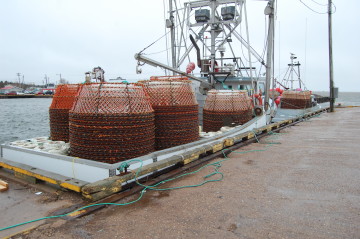 ALBERTON — Carter Hutt anticipates there will be a drive on Wednesday morning to get crab boats ready for a season which is scheduled to get underway on Friday. Hutt is president of the 27-member P.E.I. Snow crab Association. He learned soon after a Tuesday afternoon conference call with the Department of Fisheries and Oceans that fishermen on the call agreed unanimously to have the snow crab season for Area 12, which includes P.E.I. boats, commence at 4 a.m. Friday. The opening, however, remains dependent upon favourable ice and wind conditions. Even before the conference call, Hutt was optimistic the season would start Friday. Read the rest here 17:52
ALBERTON — Carter Hutt anticipates there will be a drive on Wednesday morning to get crab boats ready for a season which is scheduled to get underway on Friday. Hutt is president of the 27-member P.E.I. Snow crab Association. He learned soon after a Tuesday afternoon conference call with the Department of Fisheries and Oceans that fishermen on the call agreed unanimously to have the snow crab season for Area 12, which includes P.E.I. boats, commence at 4 a.m. Friday. The opening, however, remains dependent upon favourable ice and wind conditions. Even before the conference call, Hutt was optimistic the season would start Friday. Read the rest here 17:52
Division of Coastal Management director now Division of Marine Fisheries director as well
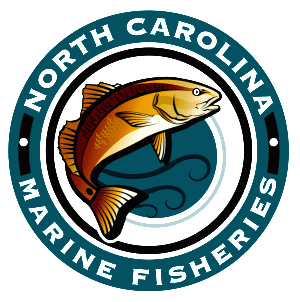 State environmental department Secretary Dr. Donald van der Vaart today named , director of the state Division of Coastal Management, to lead the state’s Division of Marine Fisheries effective immediately. For the immediate future, the divisions will remain separate entities housed under the state’s environmental agency, and Mr. Davis will lead both divisions as director. The department intends to examine ways in which the two divisions can achieve efficiencies in operations. Braxton’s knowledge of state and national coastal issues, and his experience as director of our coastal management division, made him the perfect choice to lead both groups,” said Dr. van der Vaart. Read the rest here 14:03
State environmental department Secretary Dr. Donald van der Vaart today named , director of the state Division of Coastal Management, to lead the state’s Division of Marine Fisheries effective immediately. For the immediate future, the divisions will remain separate entities housed under the state’s environmental agency, and Mr. Davis will lead both divisions as director. The department intends to examine ways in which the two divisions can achieve efficiencies in operations. Braxton’s knowledge of state and national coastal issues, and his experience as director of our coastal management division, made him the perfect choice to lead both groups,” said Dr. van der Vaart. Read the rest here 14:03
Live 3D data streaming – new Simrad visualisation SW unveiled in Vigo
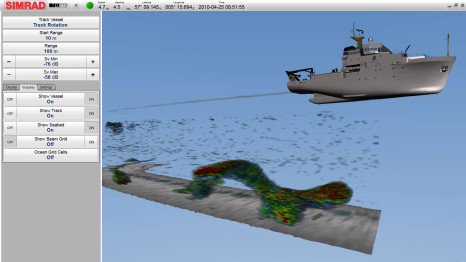 Kongsberg Maritime has unveiled an advanced new technology platform at the ICES Working Group on Fisheries Acoustics, Science and Technology (WGFAST) in Vigo today (19th April), which enables live streaming of 3D data generated by scientific multibeam systems. The unique, new Simrad TD50 data visualisation software is currently operational with the Simrad ME70 scientific multibeam echo sounder, with plans to enable 3D data streaming from a wider range of Simrad acoustic systems in the future. Accurate 3D visualisation gives users a better understanding of the marine ecosystem by i.e. enabling precise measurement of schools of fish rather than estimating size and shapes based on models.Video, read the rest here 12:33
Kongsberg Maritime has unveiled an advanced new technology platform at the ICES Working Group on Fisheries Acoustics, Science and Technology (WGFAST) in Vigo today (19th April), which enables live streaming of 3D data generated by scientific multibeam systems. The unique, new Simrad TD50 data visualisation software is currently operational with the Simrad ME70 scientific multibeam echo sounder, with plans to enable 3D data streaming from a wider range of Simrad acoustic systems in the future. Accurate 3D visualisation gives users a better understanding of the marine ecosystem by i.e. enabling precise measurement of schools of fish rather than estimating size and shapes based on models.Video, read the rest here 12:33
Scallop fishermen poised for fight over shellfish, fishermen and regulators to meet Wednesday
Scallop fishing has increased dramatically off some parts of New England recently, and 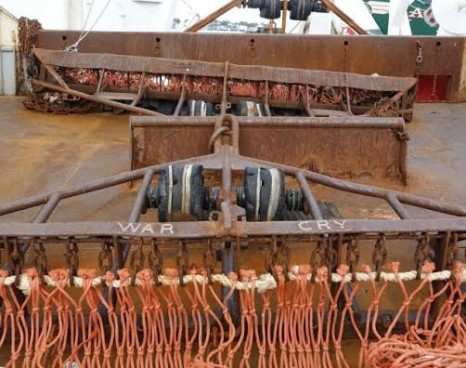 will soon meet to discuss how to avoid overexploiting the valuable shellfish. The concern over scallop fishing centers on the northern Gulf of Maine, a management area that stretches roughly from the waters off of Boston to the Canadian border. Scallop grounds off of northern Massachusetts have been especially fertile, prompting increased fishing in that area. The New England Fishery Management Council, a regulatory arm of the federal government, will hold a public meeting about the issue Wednesday (links here)and decide how to proceed. Alex Todd, a Maine-based fisherman who fishes off of Gloucester, Massachusetts, said he and others feel the rules are not equal. Read the rest here 11:46
will soon meet to discuss how to avoid overexploiting the valuable shellfish. The concern over scallop fishing centers on the northern Gulf of Maine, a management area that stretches roughly from the waters off of Boston to the Canadian border. Scallop grounds off of northern Massachusetts have been especially fertile, prompting increased fishing in that area. The New England Fishery Management Council, a regulatory arm of the federal government, will hold a public meeting about the issue Wednesday (links here)and decide how to proceed. Alex Todd, a Maine-based fisherman who fishes off of Gloucester, Massachusetts, said he and others feel the rules are not equal. Read the rest here 11:46
Its all about the Quality! Maine lobstermen learn quality improvement
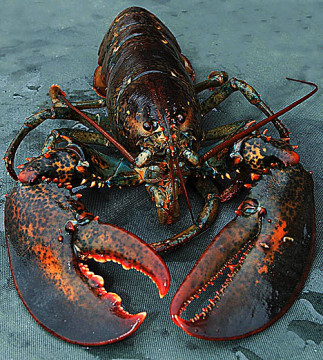 Lobstermen gathered at Kennebunk Elementary School Monday morning for a workshop on improving quality and profitability of the lobsters they harvest. The “Lobster Quality Tour” is a series of workshops put on by the Maine Lobstermen’s Association. Lobster health expert Dr. Jean Lavallee spoke on a variety of topics including lobster biology and the stressors that lobsters encounter during the harvest and points thereafter. “We’re just trying to make them more aware from a lobster’s perspective,” said Dr. Lavallee. Dr. Lavallee said a lobster takes a unique recovery from a stressor. Immediately, the lobster enters the alarm phase, then the reaction phase, followed by the resistance phase, then the exhaustion phase, and then death. Video, Read the rest here 11:27
Lobstermen gathered at Kennebunk Elementary School Monday morning for a workshop on improving quality and profitability of the lobsters they harvest. The “Lobster Quality Tour” is a series of workshops put on by the Maine Lobstermen’s Association. Lobster health expert Dr. Jean Lavallee spoke on a variety of topics including lobster biology and the stressors that lobsters encounter during the harvest and points thereafter. “We’re just trying to make them more aware from a lobster’s perspective,” said Dr. Lavallee. Dr. Lavallee said a lobster takes a unique recovery from a stressor. Immediately, the lobster enters the alarm phase, then the reaction phase, followed by the resistance phase, then the exhaustion phase, and then death. Video, Read the rest here 11:27
North Carolina Fisheries Association Weekly Update for April 18, 2016
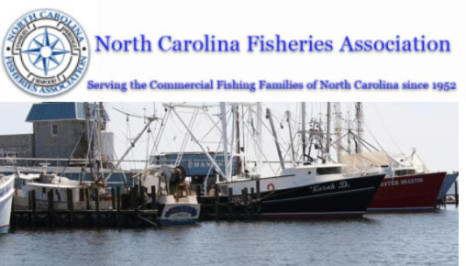 Click here to read the Weekly Update, to read all the updates, Click here 10:33
Click here to read the Weekly Update, to read all the updates, Click here 10:33
Op-ed: Bring more electronic monitoring to fishery
 In the sustainable fisheries conference held at Rhode Island College last week, audience members were asked various demographic and opinion questions about the ocean, fisheries, and management that were tabulated and presented on the spot. Unscientific, yes, but very interesting.,, We would like to see electronic monitoring pursued more aggressively, as we consider it superior to human monitors in terms of cost, efficiency and interaction with crew. We believe it will play a part in the ultimate goal of providing a consistent source of reliable data to better achieve the conservation and economic goals of the Magnuson-Stevens Act. Read the op-ed here 08:16
In the sustainable fisheries conference held at Rhode Island College last week, audience members were asked various demographic and opinion questions about the ocean, fisheries, and management that were tabulated and presented on the spot. Unscientific, yes, but very interesting.,, We would like to see electronic monitoring pursued more aggressively, as we consider it superior to human monitors in terms of cost, efficiency and interaction with crew. We believe it will play a part in the ultimate goal of providing a consistent source of reliable data to better achieve the conservation and economic goals of the Magnuson-Stevens Act. Read the op-ed here 08:16
Deepwater Wind Farm project and delays are negatively affecting fishermen
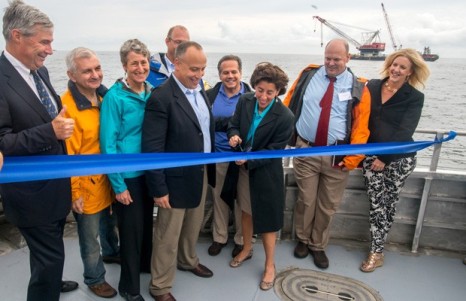 National Grid to ask for extension – Won’t impact overall project schedule! Click here That’s the problem. It won’t hurt the project, but it is affecting the fishermen. One of them contacted us, and is wild that the project has a barge and tug planted in the area he was planning on working. The project has had major impacts on fishermen, such as, the run through RI’s historic Black Point fish trap click here which essentially forced the guy to settle, and now they are running behind on land and with cable laying. After repeated promises that there would be no exclusion zone around the towers after last summer (which also needed to be extended a month and a half for which fishermen went uncompensated), the Coast Guard has now enacted another exclusion zone for which DWW says it will not compensate fishermen. Also, they have refused to compensate fishermen for the pre cable laying grapnel runs and cable installations, which, if they follow their patterns of delay and incompetence, will also hurt the industry. 07:16
National Grid to ask for extension – Won’t impact overall project schedule! Click here That’s the problem. It won’t hurt the project, but it is affecting the fishermen. One of them contacted us, and is wild that the project has a barge and tug planted in the area he was planning on working. The project has had major impacts on fishermen, such as, the run through RI’s historic Black Point fish trap click here which essentially forced the guy to settle, and now they are running behind on land and with cable laying. After repeated promises that there would be no exclusion zone around the towers after last summer (which also needed to be extended a month and a half for which fishermen went uncompensated), the Coast Guard has now enacted another exclusion zone for which DWW says it will not compensate fishermen. Also, they have refused to compensate fishermen for the pre cable laying grapnel runs and cable installations, which, if they follow their patterns of delay and incompetence, will also hurt the industry. 07:16
Import Alert! Barriers go up against shrimp and prawns from Malaysia
 American consumers are scooping up more shrimp than ever at lower prices, but it is not all good news because some aquaculture-grown shrimp and prawns from Malaysia contain residues from unapproved animal drugs and unsafe food additives. The combination of the huge consumer demand in the U.S and the growing potential for unsafe product getting into the country caused the U.S. Food and Drug Administration (FDA) to issue an import alert yesterday on Malaysian shrimp and prawns. An import alert means border agents will detain a food product without physical inspection. Read the rest here 05:44
American consumers are scooping up more shrimp than ever at lower prices, but it is not all good news because some aquaculture-grown shrimp and prawns from Malaysia contain residues from unapproved animal drugs and unsafe food additives. The combination of the huge consumer demand in the U.S and the growing potential for unsafe product getting into the country caused the U.S. Food and Drug Administration (FDA) to issue an import alert yesterday on Malaysian shrimp and prawns. An import alert means border agents will detain a food product without physical inspection. Read the rest here 05:44
Salmon markets face lower supplies
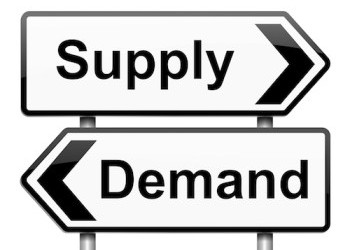 A downward shift in supplies of salmon could boost demand for Alaska fish. If that basic rule holds true, prices could move out of the basement. Some balance appears to be in the offing. Alaska’s projected salmon harvest of 161 million fish is down 40 percent from last season due to an off year for pinks. Bristol Bay’s sockeye forecast of just under 30 million is well below harvests of the past two years. That helps remove backlogs of reds, which are moving briskly through markets. A prime example: Sockeye exports to Japan, which is enduring local fishery failures, surged 320 percent at the end of last year and demand is expected to remain strong. Audio report, Read the rest here 17:51
A downward shift in supplies of salmon could boost demand for Alaska fish. If that basic rule holds true, prices could move out of the basement. Some balance appears to be in the offing. Alaska’s projected salmon harvest of 161 million fish is down 40 percent from last season due to an off year for pinks. Bristol Bay’s sockeye forecast of just under 30 million is well below harvests of the past two years. That helps remove backlogs of reds, which are moving briskly through markets. A prime example: Sockeye exports to Japan, which is enduring local fishery failures, surged 320 percent at the end of last year and demand is expected to remain strong. Audio report, Read the rest here 17:51
As Pacific sardine collapse worsens, scientists worry about possible ripple in the ecosystem
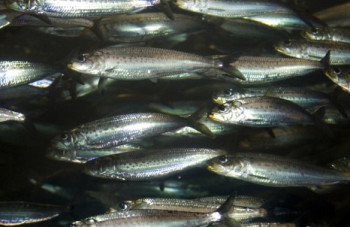 Nearly a year into a West Coast sardine fishing ban enacted to protect the collapsing population, the fish formerly worth more than $8 million to Oregon’s economy have shown no signs of a comeback. New federal research indicates numbers of the small, silvery, schooling fish have plummeted further than before the fishing moratorium, dashing any hope of lifting it in 2016. With the current sardine population hovering at 7 percent of its 2007 peak, fishermen now say they expect to wait a decade or more to revive the fishery. “I don’t want to take a pessimistic view, but I would think we’ll be shut down until 2030,” said Ryan Kapp, a Bellingham, Washington, fisherman who advises the Pacific Fishery Management Council on sardines and other fish. Read the article here 15:33
Nearly a year into a West Coast sardine fishing ban enacted to protect the collapsing population, the fish formerly worth more than $8 million to Oregon’s economy have shown no signs of a comeback. New federal research indicates numbers of the small, silvery, schooling fish have plummeted further than before the fishing moratorium, dashing any hope of lifting it in 2016. With the current sardine population hovering at 7 percent of its 2007 peak, fishermen now say they expect to wait a decade or more to revive the fishery. “I don’t want to take a pessimistic view, but I would think we’ll be shut down until 2030,” said Ryan Kapp, a Bellingham, Washington, fisherman who advises the Pacific Fishery Management Council on sardines and other fish. Read the article here 15:33
New England Fishery Management Council meeting in Mystic, CT, April 19-21, 2016 – Listen Live!
 The public is invited to listen in to the New England Fishery Management Council’s April 19-21, 2016 Council meeting. This meeting is scheduled to begin on Tues., April 19 at 9:00 a.m. at the Hilton Mystic, 20 Coogan Ave., Mystic, CT . On Wed. and Thurs. the meeting will start at 8:30 a.m. To view the Final Council Meeting Agenda, Click here To register to Listen Live, Click here 12:16
The public is invited to listen in to the New England Fishery Management Council’s April 19-21, 2016 Council meeting. This meeting is scheduled to begin on Tues., April 19 at 9:00 a.m. at the Hilton Mystic, 20 Coogan Ave., Mystic, CT . On Wed. and Thurs. the meeting will start at 8:30 a.m. To view the Final Council Meeting Agenda, Click here To register to Listen Live, Click here 12:16

































